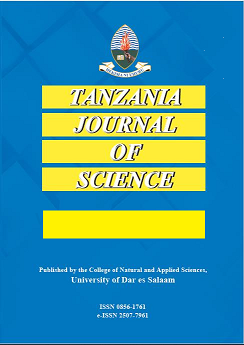Anticancer Potential of the Leaf Extracts from the Selected Croton Species
DOI:
https://doi.org/10.4314/tjs.v49i4.11Keywords:
Croton species, Phytochemicals, Toxicity, Cancer remedyAbstract
The reported investigations were aimed at establishing anticancer potential of the leaf extracts from Croton dictyophlebodes (CDE), C. kilwae (CKE) and C. longipedicellatus ssp austrotanzanicus (CLE). In vitro cytotoxicity assays of the extracts were performed against human laryngeal cancer cell line (HEp-2) and human breast cancer cell line (MCF-7), while in vivo toxicological studies were done using Swiss albino mice (Mus musculus) following the Organization for Economic Cooperation and Development guideline number 423 of 2001. Results for in vitro assays revealed that CDE and CLE induced cytotoxicity to MCF-7 and HEp-2 cell lines at EC50 values of 86 and 63 µg/mL, respectively, while CKE was inactive to HEp-2 cells at 100 µg/mL. For in vivo studies, mice were given calculated doses based on globally harmonized standards and monitored for 14 days to observe signs of toxicity. Haematological analysis was also carried out to obtain information on changes in blood conditions. The findings showed that LD50 for CKE and CDE were > 2000 mg/kg, while for CLE was 175 mg/kg body weight (b.w.). The oral administration of CDE and CKE did not reveal significant changes in haematological parameters of treated mice, while CLE provoked some. Thus, the studied extracts may be considered potential cancer remedies with safety pre-cautions that warrant further investigations.


